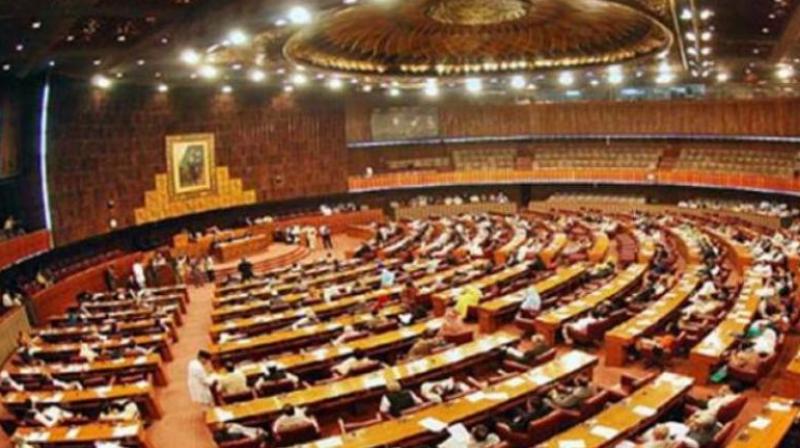Pakistan's National Assembly passes resolution to condemn lynching of student
Mashal Khan, a journalism student, in Abdul Wali Khan University in Mardan was killed by an enraged mob last week.

Islamabad: Pakistan's National Assembly has passed an unanimous resolution to condemn the "barbaric and cold-blooded murder" of a 23-year-old university student who was lynched by a violent mob over alleged blasphemy.
Mashal Khan, a journalism student, in Abdul Wali Khan University in Mardan was killed by an enraged mob last week, blaming him of passing anti-Islam remarks.
The tragedy has sparked an outrage and demands to reform the laws dealing with blasphemy. Meanwhile, Pakistan's Senate or upper house of parliament
has sought changes in the blasphemy laws to avert its misuse after the lynching.
Dawn reported that the Senators in yesterday's session called for amending the blasphemy law to punish those who concoct blasphemy accusations against others and demanded a campaign against those taking the law into their own hands.
Pakistan Peoples Party senator Farhatullah Babar said a religious scholar had proposed that those who levelled false accusations should suffer the same sentence as provided for a blasphemer.
He recalled how a federal Shariat Court decision had prompted the maximum punishment for blasphemy to be increased from life imprisonment to death, reminding the house that Raja Zafarul Haq ? the current leader of the House ? was the chairman of law and justice committee at the time.
He said the committee had made some suggestions while approving the bill and called for that report to be made the basis of any further action.
"The assassination of Mashal Khan should make us think about concrete measures to prevent the misuse of the blasphemy law; we need to revisit this law," he remarked.
Retired Gen Abdul Qayyum of the ruling Pakistan Muslim League-Nawaz (PL-N) also called for flaws in the blasphemy law to be addressed.
He stressed that Islam is a religion of peace and tolerance and prohibits any excesses, even against animals. Jamaat-e-Islami (JI) chief Siraj-ul-Haq said that the rule of law was what defined a civilised society and that even if someone was guilty of a crime, no individual or organisation had the right to punish that individual unilaterally.
"This shows an imbalance and lack of tolerance in society," he remarked. Winding up the discussion, Minister of State for Interior Baleeghur Rahman said there was clarity on the issue at a political level as Prime Minister Nawaz Sharif and the heads of political parties had condemned the incident.
However, he admitted that there was a need to check intolerance and revealed that work on a new curriculum was under way. The controversial blasphemy laws were enacted in 1980s when military dictator Ziaul Haq was in power.
There are reports that the laws are misused to settle personal issues. An allegation of blasphemy makes the people vulnerable to violence by extremists who have so far thwarted efforts to reform these laws.

